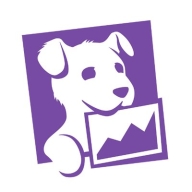

Datadog and Devo are highly competitive in the monitoring solutions category, each offering distinct advantages. Datadog has an upper hand with its vast integration capabilities and flexible dashboards, while Devo stands out in handling large data sets with high-speed analytics.
Features: Datadog provides intuitive visualization and seamless integration across platforms like AWS, Docker, and Slack. It features flexible dashboards and a versatile alerts system. Devo focuses on high-speed, real-time analytics and efficiently manages large data volumes. Its innovative tools like Activeboards and CyberChef cater to complex data manipulation and visualization needs.
Room for Improvement: Datadog faces challenges with scalability issues in dashboard performance, a complex pricing model, and integration difficulties. Users desire improved documentation and more advanced AI analytics. Devo could enhance its offering with better pre-built monitoring solutions, superior documentation, and improved third-party integrations to support SecOps seamlessly.
Ease of Deployment and Customer Service: Datadog is praised for its straightforward deployment in cloud environments. However, its customer support can be inconsistent. Devo offers simplified deployments with positive feedback on its proactive customer support, including real-time support chats for quick issue resolutions.
Pricing and ROI: Datadog's pricing model is viewed as complex and can escalate costs rapidly due to its add-on structure, although it yields significant ROI by improving reliability and reducing downtime. Devo's pricing is transparent, focusing primarily on data ingestion metrics, which aids in predictable budgeting, although issues with metadata charges remain a concern for cost management.
Previously we had thirteen contractors doing the monitoring for us, which is now reduced to only five.
Datadog has delivered more than its value through reduced downtime, faster recovery, and infrastructure optimization.
I believe features that would provide a lot of time savings, just enabling you to really narrow down and filter the type of frustration or user interaction that you're looking for.
When I have additional questions, the ticket is updated with actual recommendations or suggestions pointing me in the correct direction.
Overall, the entire Datadog comprehensive experience of support, onboarding, getting everything in there, and having a good line of feedback has been exceptional.
I've had a couple instances where I reached out to Datadog's support team, and they have been really super helpful and very kind, even reaching back out after resolving my issues to check if everything's going well.
Datadog's scalability has been great as it has been able to grow with our needs.
We did, as a trial, engage the AWS integration, and immediately it found all of our AWS resources and presented them to us.
Datadog's scalability is strong; we've continued to significantly grow our software, and there are processes in place to ensure that as new servers, realms, and environments are introduced, we're able to include them all in Datadog without noticing any performance issues.
Datadog is very stable, as there hasn't been any downtime or issues since I've been here, and it's always on time.
Datadog seems stable in my experience without any downtime or reliability issues.
Datadog seems to be more stable, and I really want to have a complete demo before making a call to decide on this.
It would be great to see stronger AI-driven anomaly detection and predictive analytics to help identify potential issues before they impact performance.
We want to be able to customize the cost part, and we would appreciate more granular access control.
The documentation is adequate, but team members coming into a project could benefit from more guided, interactive tutorials, ideally leveraging real-world data.
This is particularly evident when dealing with failed login attempts and determining true versus false positives.
The setup cost for Datadog is more than $100.
Everybody wants the agent installed, but we only have so many dollars to spread across, so it's been difficult for me to prioritize who will benefit from Datadog at this time.
My experience with pricing, setup cost, and licensing is that it is really expensive.
Our architecture is written in several languages, and one area where Datadog particularly shines is in providing first-class support for a multitude of programming languages.
Having all that associated analytics helps me in troubleshooting by not having to bounce around to other tools, which saves me a lot of time.
Datadog was able to find the alerts and trigger to notify our team in a very prompt manner before it got worse, allowing us to promptly adjust and remediate the situation in time.
When they see a spike in a line chart for a failed login, which could be a true or false attempt, they can click that spike, and a table widget on the same active board instantly populates with raw logs of data for those specific failed logins.
| Product | Market Share (%) |
|---|---|
| Datadog | 4.5% |
| Devo | 0.8% |
| Other | 94.7% |

| Company Size | Count |
|---|---|
| Small Business | 80 |
| Midsize Enterprise | 46 |
| Large Enterprise | 99 |
| Company Size | Count |
|---|---|
| Small Business | 8 |
| Midsize Enterprise | 4 |
| Large Enterprise | 11 |
Datadog integrates extensive monitoring solutions with features like customizable dashboards and real-time alerting, supporting efficient system management. Its seamless integration capabilities with tools like AWS and Slack make it a critical part of cloud infrastructure monitoring.
Datadog offers centralized logging and monitoring, making troubleshooting fast and efficient. It facilitates performance tracking in cloud environments such as AWS and Azure, utilizing tools like EC2 and APM for service management. Custom metrics and alerts improve the ability to respond to issues swiftly, while real-time tools enhance system responsiveness. However, users express the need for improved query performance, a more intuitive UI, and increased integration capabilities. Concerns about the pricing model's complexity have led to calls for greater transparency and control, and additional advanced customization options are sought. Datadog's implementation requires attention to these aspects, with enhanced documentation and onboarding recommended to reduce the learning curve.
What are Datadog's Key Features?In industries like finance and technology, Datadog is implemented for its monitoring capabilities across cloud architectures. Its ability to aggregate logs and provide a unified view enhances reliability in environments demanding high performance. By leveraging real-time insights and integration with platforms like AWS and Azure, organizations in these sectors efficiently manage their cloud infrastructures, ensuring optimal performance and proactive issue resolution.
Devo is the only cloud-native logging and security analytics platform that releases the full potential of all your data to empower bold, confident action when it matters most. Only the Devo platform delivers the powerful combination of real-time visibility, high-performance analytics, scalability, multitenancy, and low TCO crucial for monitoring and securing business operations as enterprises accelerate their shift to the cloud.
We monitor all Log Management reviews to prevent fraudulent reviews and keep review quality high. We do not post reviews by company employees or direct competitors. We validate each review for authenticity via cross-reference with LinkedIn, and personal follow-up with the reviewer when necessary.